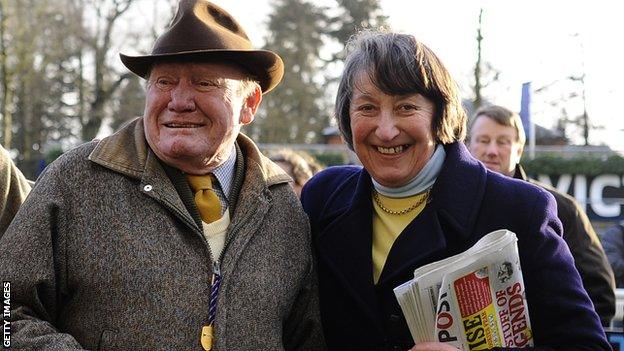Retiring Henrietta Knight a racing pioneer, says Cornelius Lysaght
- Published

Knight and husband Biddlecombe
On the face of it, the very traditional Henrietta Knight seems an odd choice to nominate as a pioneer in the world of racehorse training.
But the 65-year-old, who is to retire to spend more time looking after her husband, the ex-champion jump jockey Terry Biddlecombe, is just that.
When deftly guiding Best Mate to victory in three successive Cheltenham Gold Cups (2002-4), she was regularly knocked for restricting the horse to three or four races per season.
Today it's the norm, with no one batting an eyelid as Kauto Star or Long Run take up similarly limited programmes ahead of their Gold Cup challenges.
"We were criticised for denying the public the chance to see him," she said, "but I simply don't think he could have taken more racing than that.
"Best Mate showed the importance of time and patience when handling horses."
Time and patience have been Knight's watchwords since she sent out the first of 700-plus winners after taking out a licence to train in rural Oxfordshire in 1989.
Best Mate contributed 14 to the total, from 22 starts, with famous successes in Kempton's King George V1 Chase and the Lexus Chase, Leopardstown as well as the Gold Cup hat-trick.
She also took the King George trophy with Edredon Bleu having already claimed the Cheltenham Festival's Champion Chase with the horse.
That said, Henrietta - 'Hen' to one and all - and 71-year-old husband Terry, who suffered a stroke last year, have been much more than successful trainers.
They are, to say the least, an unlikely pairing: she the rather prim and proper ex-biology teacher in a leading private school, he the rough and ready Gloucestershire farmer's son.
Colourful and occasionally outspoken, they are two of the sport's great characters, and their absence from the racecard will be keenly felt.
Former footballer Mick Channon, once of Southampton and England and now successfully training racehorses, is to take over the "majority" of the horses.
At the moment, he has a stable full of horses mainly competing in Flat races, so perhaps as one unforgettable era of jumping comes to an end, an equally memorable new one is beginning.